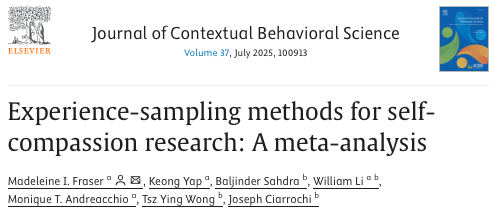Journal of Contextual Behavioral Science (JCBS)
Volume 37, July 2025
Authors
Madeleine I. Fraser, Keong Yap, Baljinder Sahdra, William Li, Monique T. Andreacchio, Tsz Ying Wong, Joseph Ciarrochi
Key Findings
• ESM studies using self-compassion measures typically sampled once daily for approximately 1-week periods.
• Within-person pooled associations between self-compassion and psychological well-being/distress were smaller than between.
• There may be more variability in these relationships within each individual across time compared to group averages.
• Research gaps in self-compassion studies using ESM include youth and clinical samples.
Abstract
Objectives Self-compassion is a sensitivity to attend to one's own suffering with a desire to take helpful action to alleviate it. Applying experience sampling methods (ESM) to self-compassion research may provide insight to the dynamic and context-specific impacts of self-compassion on psychological well-being and distress. This meta-analysis provides a synthesis of the recent growth in self-compassion ESM studies. We compare the methodologies in ESM studies and analyze the potentially dynamic relationship between self-compassion and psychological well-being and distress in daily life. Methods MEDLINE, EMBASE, PsycINFO, and Web of Science databases were searched. Studies that used a self-compassion measure and ESM were included. Thirty-one studies with a total of 3370 participants were included in the qualitative synthesis and 19 studies were included in further meta-analyses. Results Results demonstrate that most ESM studies sampled data once daily for less than one week. There were notably higher compliance rates in studies that offered financial compensation. The results of the meta-analysis indicated significant and moderate associations between within person self-compassion and both psychological well-being and distress. Between study heterogeneity ranged from 52 % to 85.6 %. It was found that within person pooled effect sizes were smaller than between person pooled effect sizes for the association between self-compassion and all outcomes, suggesting there may be more variability in these relationships within individuals across time compared to averages aggregated across a group of individuals. Conclusions ESM is a promising method of exploring within-person variability in self-compassion as experienced in daily life. Current gaps for future research to address include targeting youth and clinical samples using ESM.
